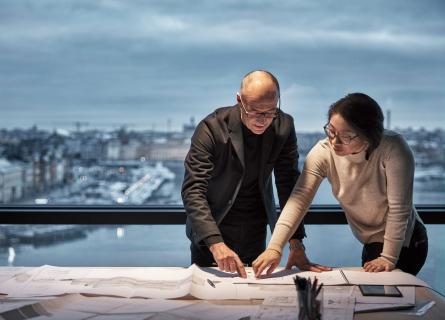
Accelerating the sustainability transition through circular economy know-how
We are in the middle of the sustainability transition that needs accelerating if we are to resolve the sustainability crisis.
The challenges we are facing are increasingly complex, and few of the so-called low-hanging fruits are left to pick. It’s time to think about organising the orchard in a new way.
In industrial production, the processes at the beginning of product life cycles require raw materials, which are further manufactured for specific use-purpose materials. In turn, they are manufactured into business-to-business products and consumer products. The more complicated products and material blends we speak of, the more actors involved in manufacturing the products. Large industrial companies have well over thousands of cooperating partners and subcontractors in their worldwide value nets. When one piece of this network gets changed, it often impacts the other parts as a result.
From the perspective of the sustainability transition, this broad network of companies and experts can also be seen as an opportunity. Each phase of the product life cycle and part of the value net of the product represents an opportunity for both small and large companies to opt for a more environmentally friendly way of manufacturing, a more easily recyclable material blend, to use fewer chemicals that harm the environment or reduce the carbon footprint of the product. A larger company can effect change through its actions by demanding all subcontractors, ranging from hundreds to thousands, as mentioned, to assume responsibility in all business they do.
The sustainability transition signifies plenty of matters
For a material developer, change in their own work can mean considering the life cycle thinking in the development phase. Previously, the focus solely lay on improving material performance using methods such as intelligent coatings or cost efficiency. However, at present, integrating environmental aspects into the development phase is crucial. New attributes to reach can include long material lifetimes and even better recyclability.
In addition to usability, a product designer decides which attributes to introduce to lengthen a product’s lifetime. These include how good materials the product should include, how easy it is to maintain and repair, and if breakable parts can be replaced when needed. Whether a comprehensive network of maintenance and repair services exists is also decisive for lengthening the lifetime.
A shop has an opportunity to make choices for its customers. If we demand responsible products from producers and suppliers, and the shop only offers them, the customer will always make the right choice. Labels, such as information about where the raw materials were acquired, how the product was manufactured, fairness and origin, and an extended warranty period, will provide all of us as consumers with the information we need to consume more responsibly.
The sustainability transition is firmly about changing the global economic model – so the conditions under which money moves are a determining factor for change. Because of this, the finance sector has a vast opportunity to influence the sustainability transition. If all financing terms include criteria which determine the impacts of the fundable action on the sustainability transition, we’re already far along. Owners, investors, and financiers have a core role in accelerating the change.
Applying the lessons learnt from the carbon neutral circular economy
We’ve awakened to the sustainability crisis and set ambitious carbon neutrality and biodiversity objectives accordingly. The carbon neutral circular economy is one of the solutions for the sustainability transition. As the first country in the world, Finland published a circular economy roadmap in 2016. Circular economy know-how has a central role in succeeding with the transition, and as one of the roadmap actions, Finland started developing circular economy education on all school levels.
Developing and teaching circular economy education has continued in Finland and worldwide. Currently, almost all corners of the globe offer circular economy education, so if there is a desire for learning, the opportunity is already there.
The sustainability transition, as a systemic change, signifies that changes occur in all sectors of society, state, companies, cities, and individual lives. From the perspective of success, it’s decisive that organisations and individuals find their own roles as change-makers and will adhere to them. We can only know what change means to us on a local level, what kind of know-how it necessitates and how we can complement it. Raising the level of know-how and education must always begin from the starting point for the country, organisation and individual in question, as well as societal and educational structures. In multiple countries, the first phase will probably be educating teachers.
Raising the level of circular economy know-how through education will also develop global sustainability markets. Those companies that are now at the forefront of developing circular economy solutions can even more easily sell them in the global markets in the future when clients learn to ask for and demand them. In the long run, this developmental work has benefits not only for companies through growing business activities but also for the globe.
Succeeding with the change requires committed people and organisations. Developmental work needs to be regarded as an investment instead of a cost – it’s well worth investing in know-how development and, most importantly, proceeding with it. The sustainability crisis is already here, so we need solutions now. Pilot projects, including education pilots, provide us with valuable first-hand experience in making the change happen, aiding us to learn by doing. The lessons learnt and experience accumulated from these projects will accelerate the sustainability transition through circular economy know-how.
This article was written by Nani Pajunen.





